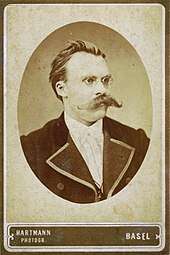Ephectics
An ephectic (Ancient Greek: ἐφεκτικός, ephektikos) potentially describes three interrelated concepts: 1) a type of skeptic, 2) the practice of a type of skepticism, or 3) the general state of being "given to suspense of judgment".[1]

| Part of a series on |
| Pyrrhonism |
|---|
 |
|
Precursors |
|
|
|
Similar philosophies
|
|
Contrary philosophies |
|
|
Etymology
Ephectic comes from the Ancient Greek ἐφεκτικός (ephektikos), which itself derives from the verb ἐπέχειν (epechein), meaning to hold back.
Definition
Pyrrho was a Greek philosopher of Classical antiquity credited with forming the first comprehensive school of skeptical thought, now described as Pyrrhonism. The school of thought can be further divided into ephectic Pyrrhonism, aporetic Pyrrhonism or zetetic Pyrrhonism.[2] Prior to Pyrrho, others had given the same rationale for which he is famed.[3]
Ephectic Pyrrhonism can describe either a state, attitude, or practice, with the state sometimes experienced after "balanc[ing] perceptions and thoughts against one another".[4] It is a less aggressive form of skepticism which may occur in that sometimes "[s]uspension of judgment evidently just happens to the sceptic".[4]
Aporetic Pyrrhonism, in contrast, describes a "more argumentative form of scepticism, one that works more actively towards its goal". Aporetic skepticism may also be described as a state of perplexity.[5] They are actively "engaged in refutation".
Zetetic Pyrrhonism, differing from the two, is "engaged in seeking".[6]
While an ephectic merely suspends judgment on a matter however arriving at that point, an aporetic skeptic engages in refutation, a form of argument before either reaching an ephectic state, an aporia (impasse), continued seeking or refutation.[4]
Criticism

One benefit of practicing ephectic Pyrrhonism is that it may be a path to happiness. It has been argued "that Pyrrho was teaching an attitude" and "it seems clear that it was intended as a way of producing happiness ... [he was] said to have possessed the great certitude that suspension of judgment and indifference is the key to happiness."[5]
On the other hand, one criticism takes the form of a joke, a sly attack on the value of ephectic Pyrrhonism by Samuel Beckett that presupposes that "If one may only be ephectic unawares, then not to know so proves one to be ephectic."[7] Therefore, being ephectic admits to flaws not only of "one's ignorance" but also of "man's palsied moral and intellectual nature" as well as the very "nature of language itself".
Friedrich Nietzsche criticized the concept as a flaw of early philosophers, who he characterized as "shy little blunderer[s] and milquetoast[s] with crooked legs" prone to overindulging "his doubting drive, his negating drive, his wait-and-see ('ephectic') drive, his analytical drive, his exploring, searching, venturing drive, his comparing, balancing drive, his will to neutrality and objectivity, his will to every sine ira et studio: have we already grasped that for the longest time they all went against the first demands of morality and conscience?"[8]
See also
References
- "ephectic". Merriam Webster. Merriam Webster.
- Pulleyn, William (1830). The Etymological Compendium, Or, Portfolio of Origins and Inventions. T. Tegg. pp. 353.
- Laertius, Diogenes (1853). The Lives and Opinions of Eminent Philosophers. H. G. Bohn. pp. 405–409.
- Bett, Richard Arnot Home (2010-01-28). The Cambridge Companion to Ancient Scepticism. Cambridge University Press. p. 213.
- McInerny, Ralph (1969). A History of Western Philosophy, Volume 2. Aeterna Press. pp. Chp III. Skeptics and the New Academy, A. Pyrrho of Elis section, para 3–4.
- Bett, Richard Arnot Home (Jan 28, 2010). The Cambridge Companion to Ancient Scepticism. Cambridge University Press. p. 212.
- Houppermans, Sjef (1996). Beckett & La Psychanaylse & Psychoanalysis, Vol 5. Rodopi. p. 110.
- Friedrich Nietzsche; Maudemarie Clark; Alan J. Swensen (1998). On the Genealogy of Morality. Hackett Publishing. p. 79.